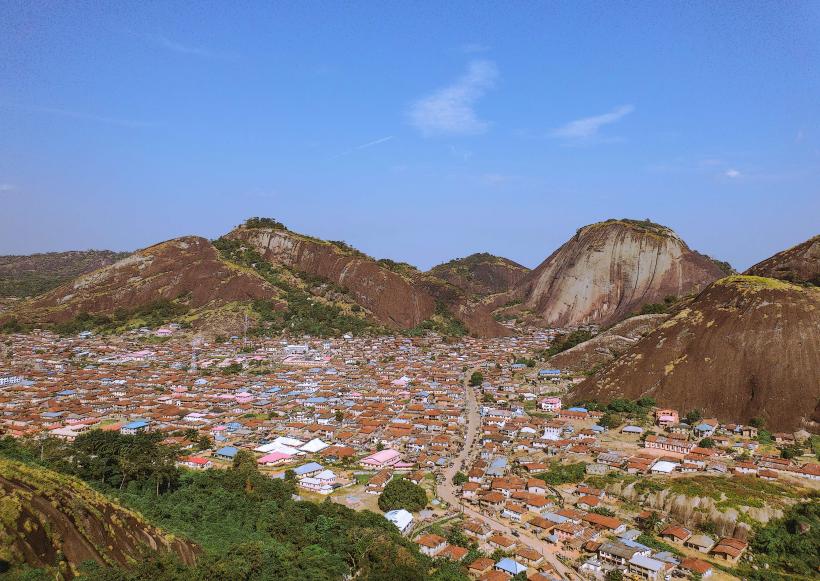Information
Landmark: Ogun State Cultural CentreCity: Abeokuta
Country: Nigeria
Continent: Africa
Ogun State Cultural Centre, Abeokuta, Nigeria, Africa
The National Museum Abeokuta is a key cultural institution located in Abeokuta, the capital city of Ogun State, southwestern Nigeria. Established in 1974, the museum is part of the National Commission for Museums and Monuments and serves as a vital center for the preservation and display of the history, art, and culture of the Egba people and the wider Yoruba civilization.
Location
The museum is located within Baptist Girls College, Idi-Aba, Abeokuta. It is nestled in the heart of the city and is easily accessible from the central areas. The museum's address is:
Inside Baptist Girls College, Idi-Aba, Abeokuta, Ogun State, Nigeria.
Historical and Cultural Significance
The museum is known for its extensive collection of artifacts that showcase the rich cultural heritage of the Egba people and the Yoruba culture. The Yoruba, one of Nigeria's largest ethnic groups, have a long history that is reflected in the museum's exhibitions.
The Egba people settled in Abeokuta in the early 19th century, escaping intertribal warfare and seeking refuge in the region's natural fortifications, notably Olumo Rock. Many of the museum’s exhibits are tied to these historical events, including tools, pottery, sculptures, and ceremonial objects that give insight into the daily life, social structure, and beliefs of the ancient inhabitants.
Collections and Exhibits
The National Museum Abeokuta houses a diverse collection of objects, many of which date back centuries. Some of the key highlights include:
Artifacts from Olumo Rock:
The museum features items unearthed from Olumo Rock, including tools and relics that were used by the early settlers of the region. These items tell the story of the people who sought refuge in the rock during times of war and conflict.
Traditional Sculptures and Carvings:
A number of sculptures, some of which are religious in nature, can be found in the museum. These include bronze and wooden carvings that reflect the artistic achievements of the Yoruba people.
Adire Textiles:
Adire is a traditional Yoruba textile-dyeing technique, and the museum has a collection of Adire fabrics. These textiles are typically decorated with symbolic patterns and used in ceremonial attire.
Pottery and Stone Tools:
The museum displays pottery, stone implements, and other tools used by early Yoruba settlers. These items offer a glimpse into the day-to-day lives of the ancient community.
Ceremonial and Religious Objects:
Various religious artifacts are on display, including shrines, ritual objects, and symbols associated with Yoruba deities. These pieces are an important part of Yoruba spiritual life and are used in traditional religious practices.
Colonial and Post-Colonial Exhibits:
The museum also features some objects from the colonial era, offering insight into the period of British rule and its impact on the region. Items from this period include documents, photos, and everyday objects used during colonial administration.
Cultural Importance
The National Museum Abeokuta is not only a place for historical preservation but also an educational resource. It plays a crucial role in cultural preservation by providing a space where both locals and visitors can learn about the traditions, history, and art of the Yoruba people. It helps in fostering cultural pride, especially for younger generations.
Additionally, the museum offers ethnographic displays that give visitors an understanding of the diverse cultures of Ogun State and the Yoruba people, helping to promote cultural tourism in Nigeria.
Visiting Information
Opening Hours: The museum is open from Monday to Friday, 8:00 AM to 4:00 PM. It remains closed on weekends (Saturday and Sunday).
Entry Fees: There is a nominal fee of about ₦100 for entrance. However, charges may vary depending on the visitor's group type or special events.
Photography: Visitors are not allowed to take photographs inside the museum.
Tour Guides: The museum provides professional tour guides who offer in-depth explanations of the exhibits. This is especially useful for visitors who are keen on understanding the history and significance of the artifacts.
Nearby Attractions
Olumo Rock: A short distance from the museum, Olumo Rock is a natural fortress and a major historical site for the Egba people. The rock has become one of Nigeria’s most iconic tourist attractions. Visitors can climb to the summit and explore caves, shrines, and remnants of the ancient settlement.
Baptist Church Abeokuta: A historic church located near the museum, which adds to the region’s colonial and post-colonial heritage.
Accessibility
The museum is easily accessible within the city of Abeokuta. Visitors can use taxis or public transport options such as Okadas (motorcycle taxis) and Keke Napep (tricycles) to reach the museum. The city is also well-connected to other parts of Ogun State and Nigeria by road.
Contact Information
Phone: +234 803 588 2423
Website: The museum does not have a dedicated website but can be contacted through the National Commission for Museums and Monuments for further details on visiting hours, events, and exhibitions.
The National Museum Abeokuta stands as a central pillar of cultural heritage in the region, celebrating the rich traditions of the Yoruba people and offering a valuable resource for both tourists and scholars alike. Whether you're interested in art, history, or anthropology, the museum offers a deep and fascinating insight into Nigeria's cultural wealth.


